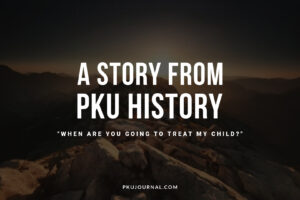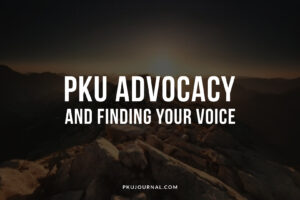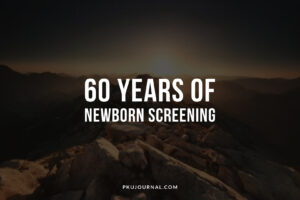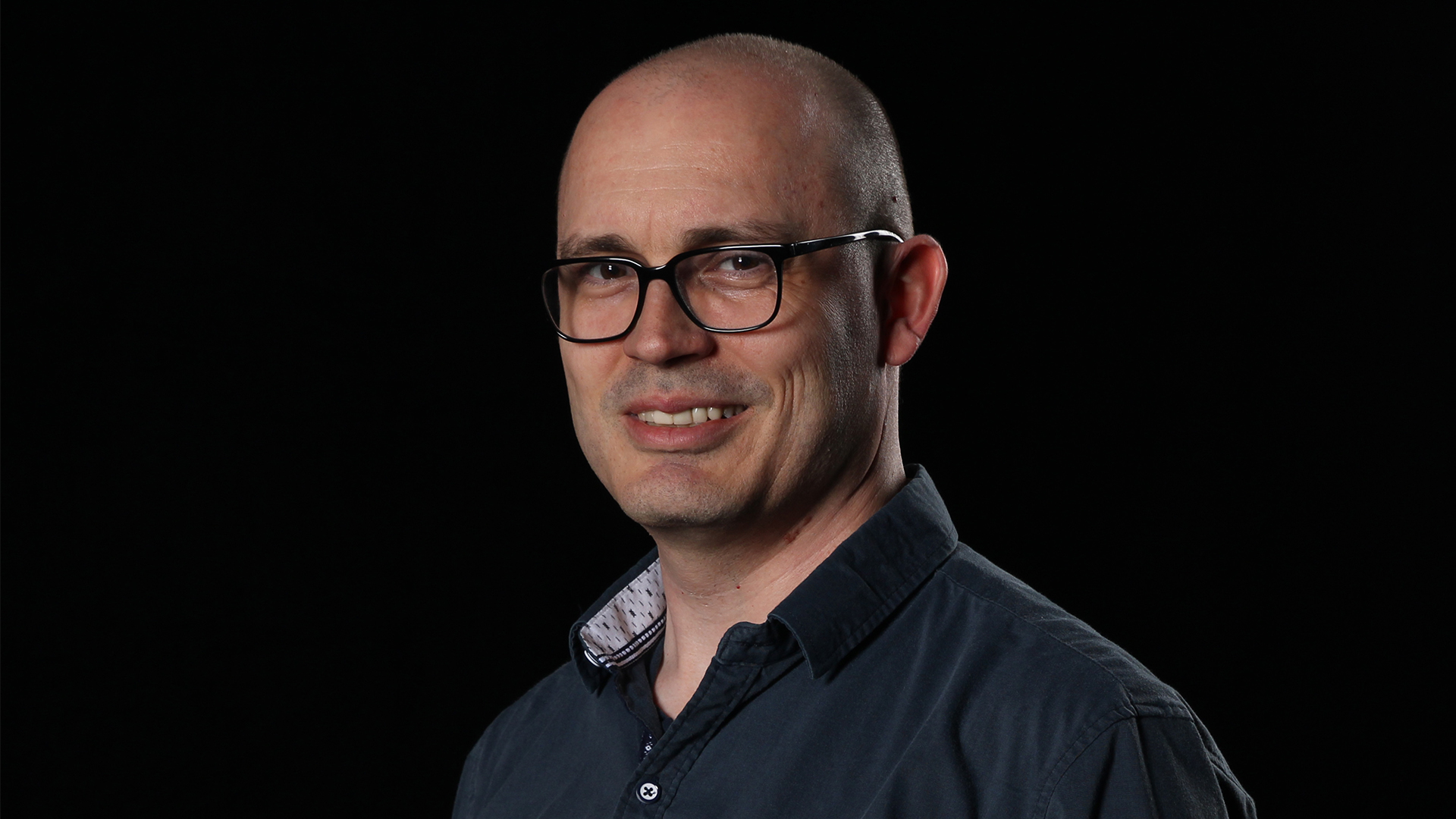In this deeply personal episode, I share my struggles with PKU treatment and how it affected my academic and professional life. I discuss the change in PKU treatment philosophy and how my challenges in adhering to the diet transformed me.
“Never, never, never give up.”
That’s how I sign off each episode in these full seasons. It’s more than just a catchphrase.
It’s a reminder… to myself.
This show is an opportunity for me to share my view of the world, my thoughts on issues affecting the rare disease community, and my reflections on life.
But the reason I keep writing, keep speaking, and keep sharing these stories…
Is that I need to hear this…
Constantly.
I have struggled with perseverance my entire life. When I was younger I often bounced around from one thing to the next… fully excited about whatever I was doing in the moment… but ready to give up at any moment and move on to the next thing.
Sometimes I’m amazed that I’ve kept telling stories and playing music for so long.
But those activities became so important to me that they’ve remained with me for life.
But all through my twenties… I was distracted. Constantly moving from one thing to the next… beginning projects and never finishing them.
Until my early thirties… when I got involved in PKU advocacy.
There’s a reason I get emotional when I say that advocacy changed me. I felt like I wandered all through my twenties, searching for a meaning and purpose… in my life and in my work.
I wasn’t happy covering the news. I’d be standing at a crime scene in the middle of the night, sometimes in the pouring rain, and thinking to myself, ” I have got to do something else with my life.”
So when I discovered advocacy… I discovered my mission in life. It felt like a perfect vehicle for me to use the skills I had developed in journalism to try to make a difference in people’s lives… for a community that meant everything to me.
And since then… I’ve learned what it means to be fully committed to an idea. To devote yourself to something greater than yourself. To be determined to change things… or at least, try.
But this… this is the story of how I got there…
It’s the story of how I struggled with perseverance for so long, in my case, because I was struggling with my rare disease treatment.
It’s a story I have shared in part… but have been scared to share in detail… because of the shame that’s often associated with struggling with the PKU, low-protein diet.
The story begins… when I almost gave up.
Understanding My Rare Disease Story
“3, 2, 1…”
You don’t hear me say that. But I say it all the time.
It’s a technique I learned from television reporters. They say it anytime they record a voiceover or a “look-live”—that’s a segment that appears live but was recorded in advance.
That countdown also helps an editor know where a take begins. And it helps the reporter find the pacing for what they’re about to record.
I use this technique. All the time. It’s in the raw recording files for this podcast. I also say it anytime I record a video for social media.
It helps me transition my mind from casual conversation mode to storytelling mode. I might post casual videos from time to time… but, at heart, I’m still a broadcaster.
I also say this countdown to myself, silently, right before I give a remote speech.
Like the speech I gave in December 2023 at a virtual event hosted by the Global Association for PKU, or GAP.
I called that speech “Owning Your Rare Disease Story”, and I later adapted it into an episode for Rare Disease Week earlier this year. This opportunity came along at the last minute after a conversation with a friend from the PKU community in Australia.
As I prepared my speech, I tried to find my emotional connection to the story. That’s something I do with any story I tell, whether that’s an episode of this podcast or a video I produce at work.
It’s like an actor trying to find a connection to the material. How do I relate to this?
Once I find what a story means to me emotionally, I’m ready.
Well, I wrote my speech, but something was still missing. I hadn’t connected with it yet.
Until the night before.
I thought I was ready, but then I had a realization: “Someone, somewhere needs to hear this message.” I believe—passionately—in the power of words and ideas to change lives. I thought, “Maybe there’s an adult out there struggling with the PKU lifestyle, and they just need some hope. Maybe there’s a child and they need to see someone just like them… all grown up.”
And that’s when it hit me. “I’m not ready.”
I’ve been in broadcasting for a long time, and it’s ingrained in me: “The larger audience, the better.” “Numbers are what matter.” “More… more… more.”
But advocacy has taught me the power of connecting with individuals.
So, when I prepare for a speech—or even an episode of this podcast—I try to imagine a single person. How maybe, just maybe, something I have to say might change things for them.
I completely restructured the speech that night. And in doing so, I found just one small way for me to connect with the story.
I was trying to understand my rare disease story. And I forced myself to think about a period in my life that I’d rather forget.
I remembered the years when I struggled with my rare disease treatment.
I produced “My PKU Life” about 7 years after the experiences described in this story. I had no connection to the PKU community at the time. And since then, I’ve learned about the experiences of others around the world. I don’t speak about PKU the same way anymore. I don’t talk about being a “normal, productive” person. Life is about more than productivity. Our health is most important. And your value is not based on what you do, but who you are. You are a human being with inherent dignity—deserving of respect and honor simply because you exist.
Almost Giving Up in College
I vividly remember the phone call.
I was standing outside at my house, staring up at the sky through the tall North Louisiana pine trees.
Thinking, “How did I get here?”
I was on the phone with my dad telling him about my latest grades. I was mid-way through my sophomore year of college.
I had bounced around from school to school. One semester at Louisiana State University in Baton Rouge. Socially, it was the best period of my life. Academically, the worst. I dropped the spring semester after getting sick during midterms and returned home.
I worked the rest of the spring and summer, and went to another school in the fall—The University of Louisiana at Monroe. Another semester. More great friends. More bad grades.
I just couldn’t focus.
“What is going on?”, I thought. “Am I just lazy?”
If I applied myself, I did well. But I had little motivation.
I returned home, again.
And this time enrolled at Louisiana State University in Shreveport. And after another semester of barely getting by, I felt defeated.
I had dreams. Goals. Ambitions.
But I could not focus.
I felt like I was at war with my mind—unable to do the things I wanted to do. Or communicate what I felt deep inside.
When I was standing outside, on the phone with dad, I remember saying, “Maybe college isn’t for me.”
Transitioning to Professional Life
Somehow, I stuck with it and finished college. It continued to be a struggle. And, all these years later, I honestly don’t remember why I didn’t quit school. Something about that conversation with Dad stuck with me, and I kept trying. He encouraged me to not give up.
Remember… I come from a military family. I shared that story in season one. And “never give up“… it’s a creed. A silent declaration, with actions if not always words: “This is how we live our lives. This is what we stand for.”
Fast forward a few years. I was in my mid-twenties, working in broadcast journalism. Life was still a challenge. Just a different sort of challenge.
I’ve shared my experiences working in the field. That’s something I kept to myself for a long, long time. But I’ve opened up about that, and shared that story over the last few years.
It’s a different kind of stress than college.
By this point, I was used to covering tragedies—perhaps already too numb and jaded. I had seen… a lot.
Professionally… sometimes I did good work. But I was inconsistent.
Sometimes I would forget the simplest things… like charging camera batteries. Or loading a tape into the camera. Or hitting record. I would zone out in the middle of an interview and not realize that I had hit the end of the tape and was no longer recording.
And, yes, we filmed on tape back then. This was in the early and mid-2000’s. So we couldn’t record to a memory card.
And… Internet speeds weren’t fast enough for streaming yet. So, if we wanted to broadcast live, we had to use a TV live truck.
One time, while out with the truck, I forgot to lower the mast. The mast raised 50 feet into the air. It had a dish at the top that sent the signal back to the station. I forgot to lower it, drove off, and the entire truck started swaying back and forth. The mast almost hit nearby powerlines.
That could have killed me.
I was on an unsustainable path.
After discussing all of this with my wife, and considering how physically, mentally, and emotionally exhausted I was… all the time…
She recommended that I reach out to my genetics clinic at Tulane Medical Center in New Orleans.
This photo was taken a few days after I started at KTBS-TV. I was not healthy at the time. I was eating a basic vegetarian diet, but not tracking my protein intake. And I was not drinking any of my PKU medical drinks. I worked long shifts and it was exhausting. But at the time, I couldn’t realize I there was a problem. That’s the danger of being off of PKU treatment—you can’t tell that you’re unhealthy.
Returning to PKU Treatment
I hadn’t been to my clinic in years. It was something we did routinely when I was younger… pack the van, drive five hours to New Orleans, go to clinic, and then visit the French Quarter, as well as other sites around the city. But as I grew up, that happened less frequently.
Earlier in this season I shared some of the history of PKU treatment. I was born at a time when PKU families were told maybe—just maybe—one day the PKU, low-protein diet could be suspended.
And so, as I got older I didn’t stop adhering to my PKU diet completely. But I didn’t track what I ate. And even though I ate a basic vegetarian diet, in retrospect I was eating too much protein.
I’ve shared all this before.
But here’s what I haven’t shared.
When I returned to clinic, I learned that all these symptoms—the inability to focus, the lack of motivation, the complete exhaustion… it was all related to PKU and my high phenylalanine, or PHE, levels. Remember, that’s the amino acid that’s toxic to us. If it builds up in our bodies, it travels to the brain, crosses the blood/brain barrier, and causes brain damage.
My doctor and dietitians told me that the philosophy of PKU treatment had changed. The new standard was “diet for life”.
I started drinking my PKU medical drink again. Being diligent with my low-protein diet, or at least… trying to. And tracking everything I ate.
Every day was a struggle. But over time, I felt better.
I felt like a different person.
I felt like myself again.
Reframing How I Think About the PKU Diet
This is another one of those stories that I’ve been terrified to tell.
Because, for the longest time, I’ve said that I’ve been “on-diet” my entire life.
It’s how I described myself in my film “My PKU Life”, and all these years since in my PKU advocacy work.
I believed it then. In a sense, I still do. I never went completely “off-diet”.
But I wasn’t healthy.
I’ve avoided talking about this… because of shame.
I’ve said that my life changed when I started sharing my story. One huge adjustment for me… is that people started speaking of me as if I were a role model for following the PKU diet.
I was on newer medication for PKU by that point, with a much higher tolerance for protein in my diet.
But still in denial about the years when I struggled.
For a long time there has been a mentality about the PKU diet that I think isn’t helpful: “Just do it”.
It’s something I see when I look at all of the records my parents saved when I was a child. I see my blood level results showing how much PHE was in my system. And phrases like “Must do better.” as if my parents weren’t doing their best.
Or I see it on social media… from those who are doing well with their or their child’s PKU treatment… but with no understanding of those in a different situation.
Sure, that’s the ideal scenario: “Just do it”. But it’s not the reality for many people.
And while part of me is an idealist, and always will be… life has also made me a realist.
For some people, this rare disease life is hard. And some can’t get access to specially created low-protein foods that they need because of their severe protein restriction.
When you want to be healthy, and you can’t because you can’t get your prescriptions, you can lose hope.
And when people have lost hope, they need help. Not judgment or condemnation.
In my case, I thought I was doing the right thing. I was following the medical advice I received as a child. But it was wrong. It was just wrong. They were still learning about PKU at the time.
So, yes, I suffered the cognitive consequences of those high PHE levels in my late teens and early twenties. That’s the reason I struggled so much during college.
I wasn’t lazy.
I just wasn’t healthy.
As I began to travel the world on my PKU advocacy journey, giving speeches and producing videos about PKU, I began to see how other people live with this rare disease. I gained so much perspective about PKU life all over the world.
But I also heard people talk about me as if I had always adhered to the diet… perfectly.
I didn’t know how to speak up and say, “I’m learning more about PKU myself. And I’m realizing that I haven’t always been healthy.”
Perfection vs. Health
All of us are learning more about our rare diseases every day, even those of us who spend most of our lives engaged in advocacy.
Recently, I’ve meditated on this a lot, the dual roles we have. On one hand, advocates who speak for and try to encourage others. But on the other hand, people affected by a rare disease, struggling and learning ourselves.
I haven’t always lived the PKU lifestyle perfectly. But that illustrates the dilemma perfectly. Are we talking about perfection, or health? Because frankly, I dare anyone who doesn’t have PKU or another rare disease—anyone—to walk one day in our shoes and say it’s easy.
I believe that, in general, people are much more understanding and supportive now. But I still see comments from time to time that are not helpful. So, I had to say this.
These days, I choose to admit, “I haven’t always been healthy.” But I’m trying, both for myself and for those who follow my work and listen to what I have to say. I’m trying.
And I hope every day, that I’m living this day, just a bit healthier.
A Message for a Special Listener
“3, 2, 1…” I’m saying it again now for a different reason… to lower my anxiety.
You might listen to this show or follow me on social media and think it’s easy for me to open up and share my life.
It’s not.
It’s something I force myself to do. I’ve learned the value of pushing myself, just a little bit, every day.
One way I do that is by sharing my life on social media. It has changed me. I learned to open up, one day at a time.
I also push myself at work these days. I’m healthy, focused, motivated, and energized. And I also have my advocacy work, which I treat as my life’s work. It’s the reason I get out of bed every day, passionate about life.
I love connecting with others in the rare disease community. I. Love. It.
And that story I shared early in this episode—about my speech at the Global Association for PKU event…
After I gave that speech I moderated a panel discussion with other adults living with PKU (available to view here). I was joined by a friend from the US, one from Australia, another from England, one from Ireland, and another from the Czech Republic… all people I’ve met in person and befriended throughout my advocacy journey.
We had an amazing conversation. But the reason I’ll hold it close to my heart as long as I’ll live… happened the next day.
A PKU mother from Serbia tagged me in a post on social media. And she shared a photo of her 8-year-old son, Marko, who stayed up late in his time zone… to see adults who have PKU, just like him.
I looked at the photo and thought, “This is why I rewrote my speech. This is who I was speaking to.”
And… I cried… as I thought about the different world he was born into than the one I was. One in which we have a better understanding of PKU and all rare diseases.
So, I want to close this episode by doing something a little different, and speak to one person.
Marko,
Thank you for staying up late to watch me and my friends share our stories of living with PKU. It meant so much to us.
I hope what we said helps you in some way.
I hope the struggles we shared are not your struggles.
I hope your generation knows a different life than the one we experienced.
I hope people are kinder, gentler, and more understanding of what it’s like to live with a rare disease.
But most importantly…
If life gets hard for you as you get older, and you just want to be like everyone else around you…
I hope you remember that you are amazing just the way you are.
And I hope that you never, never, never give up.











Leave a Reply